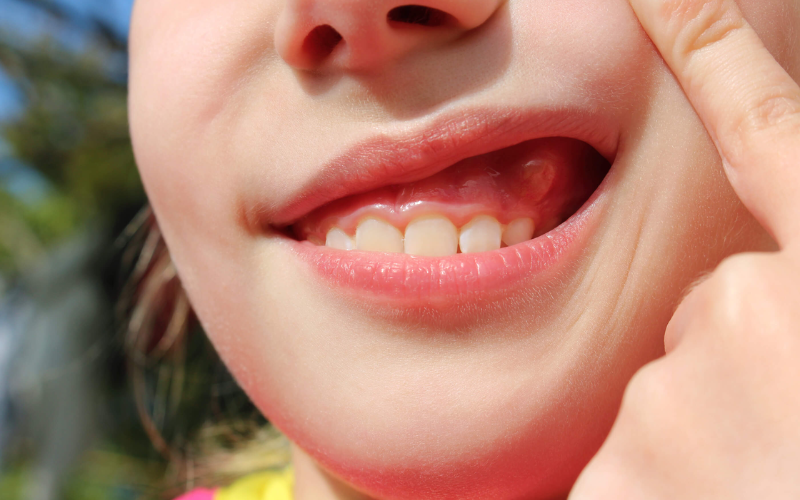Spokane Valley:
(509) 228-3834

Dental Emergencies In Active Kids: Safety Tips For Sports & Play
Kids are always on the move, whether they’re playing sports or just being active outdoors. While their boundless energy is great for their health, it also makes them prone to injuries—especially dental emergencies. Protecting your child’s teeth during play and sports is crucial for preventing painful accidents and preserving their smile.
In this blog, we’ll explore common dental emergencies in active kids and provide practical safety tips to keep their teeth safe during sports and play.
Dental Emergencies In Kids
Understanding the types of dental injuries that kids are most likely to face during sports and play is essential for prevention. Here are some common dental emergencies playful kids encounter with:
- Knocked-Out Teeth (Avulsion): A tooth can be completely knocked out due to a hard hit, especially in contact sports like football or basketball.
- Chipped or Fractured Teeth: A fall or blow can cause teeth to chip, crack, or fracture, leading to pain and long-term damage.
- Tooth Intrusion: This occurs when a tooth is pushed back into the jawbone, often due to a direct blow.
- Lip or Tongue Injuries: Cuts and lacerations to the lips or tongue can occur from biting down too hard during play or from a fall.
- Loose Teeth: A hard impact can make a tooth feel loose or wobbly, which can lead to nerve damage if untreated.
These emergencies can be alarming, but the good news is that most are preventable with the right precautions.
Why Is Dental Safety Important During Sports and Play?
Active kids are at a higher risk for dental emergencies due to their constant movement and involvement in high-energy activities. The American Academy of Pediatric Dentistry (AAPD) recommends that children participating in organized sports or vigorous play take steps to protect their teeth and mouths.
Dental safety not only prevents injuries but also saves time, money, and stress by avoiding emergency dental visits and long-term treatments like root canals or dental implants.
Safety Tips to Prevent Dental Emergencies
Prevention is always better than cure, and these safety tips will help keep your child’s teeth safe while they enjoy sports and active play.
1. Use Mouthguards for Sports
One of the most effective ways to protect your child’s teeth is by ensuring they wear a mouthguard during sports. Mouthguards absorb the shock of an impact, reducing the chances of broken or knocked-out teeth. They are particularly important for contact sports like:
- Football
- Hockey
- Basketball
- Soccer
- Wrestling
- Boxing
Types of Mouthguards
- Boil-and-Bite Mouthguards: These can be purchased from sporting goods stores and molded to fit your child’s teeth after softening them in hot water.
- Custom-Fit Mouthguards: These are created by a dentist and provide the best fit and protection. Though more expensive, they offer superior comfort and durability.
2. Helmets Are a Must

While helmets are generally thought of as protecting the head, they are equally important for dental protection. Helmets prevent head injuries that could lead to broken teeth, especially in sports like cycling, skateboarding, or football. Look for helmets with face cages or shields for additional protection in high-contact activities like hockey.
3. Teach Safe Play Techniques
Encouraging your child to practice safe techniques in sports and play can reduce the risk of dental injuries. Here are a few key areas to focus on:
- Proper Falling Techniques: Teach your child to fall correctly to avoid landing on their face. For example, tucking in the chin and using their hands to break a fall can minimize dental injuries.
- No Biting on Equipment: Kids sometimes bite down on mouthguards, sports equipment, or water bottles, which can lead to cracked teeth.
- Avoid High-Risk Behavior: Discourage roughhousing or playing sports without the appropriate safety gear.
4. Hydration and Oral Care
Keeping your child hydrated during physical activities is essential, not only for their overall health but also for their dental health. A dry mouth can increase the risk of oral injuries and tooth decay. Encourage your child to drink plenty of water to keep their mouth moist and help wash away bacteria.
5. Supervision and Safety Guidelines
Even though children are naturally active, it’s important to supervise their play, especially when engaging in activities with a higher risk of injury. Establishing safety guidelines for both sports and play can reduce the likelihood of accidents. Some ways to supervise and set rules include:
- Establish Play Boundaries: Make sure kids play in safe areas away from sharp edges, hard surfaces, or equipment that could cause injury.
- Organized Sports: Ensure that your child’s coach emphasizes safety and uses appropriate protective equipment.
- Outdoor Play: Make sure playgrounds and backyards are free of hazards like hard surfaces, rocks, or exposed metal.
What To Do In a Dental Emergency?
Even with precautions, accidents can still happen. Knowing how to respond quickly can make a big difference in saving your child’s tooth.
Here’s what to do in case of common dental emergencies:
- Knocked-Out Tooth: Rinse the tooth gently with water and try to place it back in the socket. If this isn’t possible, store it in a container of milk and seek immediate dental care.
- Chipped or Broken Tooth: Rinse your child’s mouth with warm water and apply a cold compress to reduce swelling. Collect any pieces of the tooth and visit the dentist as soon as possible.
- Toothache or Loose Tooth: Have your child rinse their mouth with warm water. Avoid using any painkillers directly on the tooth. See a dentist promptly for treatment.
- Tongue or Lip Injury: Apply pressure with a clean cloth to stop bleeding and use a cold compress to reduce swelling. For severe cuts, visit an emergency dentist or hospital.
Active play and sports are vital for children’s development, but they also come with risks, including dental emergencies. Following safety measures outlined in this blog can significantly reduce the chance of dental injuries.
Preventing dental emergencies in kids requires a combination of proper equipment, education, and vigilance. With these tips, you can keep your child’s smile safe while they enjoy the activities they love.
Make sure to prepare for the unexpected, and if a dental emergency does occur, knowing how to respond quickly can save your child’s tooth and prevent further complications.




